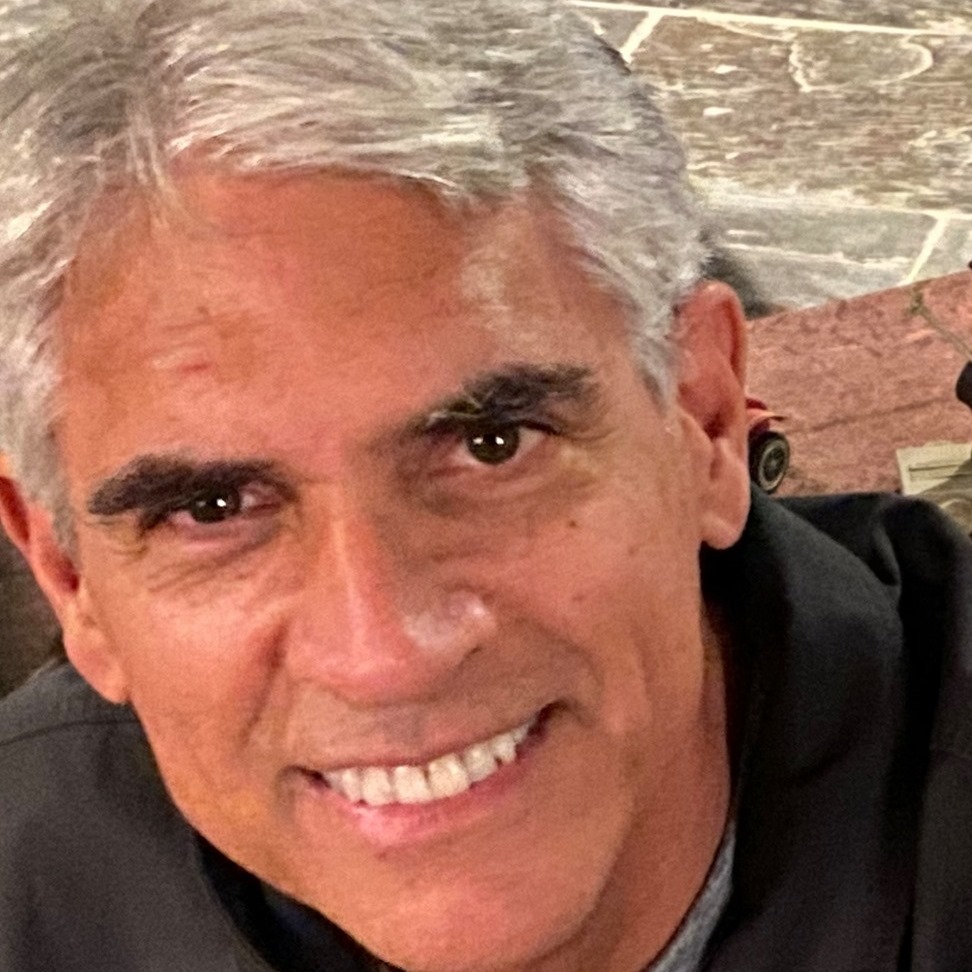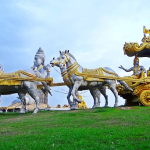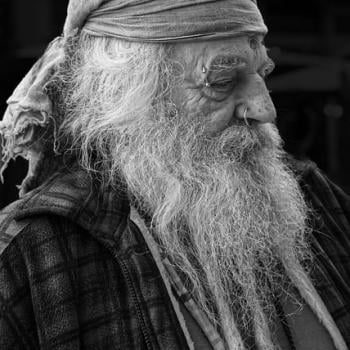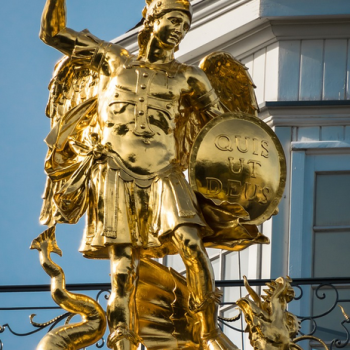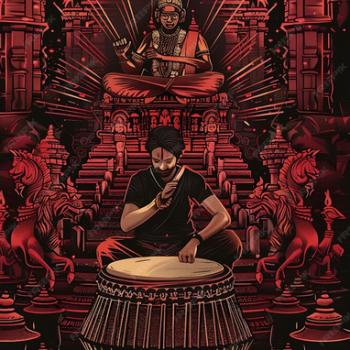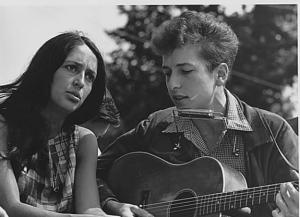
Those who are not part of the dharmic traditions often are quite challenged by the concept of reincarnation. I recall how I reacted when I learned of it. Perhaps it’s just easier to conceive of oneself as perpetually existing as the person we are now, and residing in heaven with all our friends and family who were lucky enough to join you.But there are those who take rebirth multiple times while not leaving the physical body. A perfect example is the illustrious Bob Dylan.
The Early Years
I think the 1st time I ever heard the former Mr. Robert Zimmerman was at a get together of friends in my 6th grade class at home of a classmate. The year is 1966. And our host pulls out a 45 disc that makes a significant impression on us all. For one thing, the song lasts about 6 minutes. Hold on. How can the radio play a record that long? You must understand that at this point in our popular history, most songs we’d hear ran about 2.5 minutes. 6 minutes was, well, revolutionary. The song was “Like a Rolling Stone.” It was then and there that Bob Dylan became a serious part of my life.
A few years ago, it was announced that Mr. Dylan has been awarded the Nobel Prize for Literature. There are those who protested this decision on the grounds that a songwriter is not a poet. So often this is true; but not with Bob. More often than not a popular song needs both the lyrics and music to be appreciated to the fullest. You’ll have a hard time finding someone who appreciates the works of The Beatles more than I, but very few of their songs, as a group or in their solo efforts, can stand alone on a piece of paper.
But so many selections from the canon of The American Bard do just that. If he weren’t a musician, he could have been a poet laureate. One critic of the Swedish academy’s choice was afraid that this will set a dangerous precedent, honoring the authors of simplistic tunes expressing teen passions. The poetic music of Dylan belongs in a different universe.
Prof. Gordon Ball, an instructor of English at Washington & Lee University has been a champion of Dylan for years. As to the recent accolades he writes:
“Idealism and benefiting humanity often, of course, move hand in hand, and Dylan’s idealistic, activist songs have indeed helped change our world. His 1963 Tom Paine Award (an earlier recipient, Bertrand Russell, was one of three philosophers — not counting Sartre — to win the Nobel in literature) came after Blowin’ in the Wind, Oxford Town, and other works, as well as his going South to help with voter registration drives. An attitude aired in his 1965 It’s Alright, Ma (I’m Only Bleeding). “Even the President of the United States / sometimes must have / to stand naked” — may have helped revise our view of presidential authority, encouraging inquiry into what became Watergate…For a generation raised in conformity, Dylan validated imagination and independence of thought; his work is emblematic of the creativity of the 1960s in the U.S., and has affected others across the globe. Asked …if growing up in Germany he had an “American Dream,” German Foreign Minister Joschka Fischer replied, “Not an American Dream, but my very own dream of freedom. That was for me the music of Bob Dylan.”’
The Jester Takes On the Establishment
If you didn’t grow up in the ‘60s in the United States it’s hard to relay just what we were going through. Those of us in the Baby Boom were raised in relative comfort; compared to our parents, who survived the Great Depression and World War II. While most of us were not conflicted with enjoying the comforts of personal mobility, education, food enough to waste and enough spending money to get us through the weekend, there was an inner angst that many felt. The previous generations lived with extended familial and ethnic communities, often just scraping by. We were often subjected to suburban living, far flung from the roots that sprung us.
The pressure to “be successful” and to prostrate before “The Establishment” was a potent force. While not obvious, The Establishment (a conglomeration of business, political, social and religious factors that often worked in unison when the various elements agreed) created networks that encouraged racism, unhealthy corporate cultures, fear-based politics and stunted spirituality. Bob Dylan was arguably the most prominent voice in music at this critical juncture in our culture. His songs urged us to question authority (The Times They are a-changin’), to come right out at mock it (Subterranean Homesick Blues). These were not merely songs, but inspired anthems that were sung at rallies across the nation.
Bob Dylan was often referred to as a prophet. Many think that a prophet is one who supposedly tells the future. That is one definition. But the dictionary also says that a prophet is “one gifted with more than ordinary spiritual and moral insight; especially: an inspired poet.” It could be argued that Bob is eligible to be considered both. We paused with skepticism at every governmental pronouncement, stopped going to church, and shook our fists at the mighty evil perpetrated by western countries called the Vietnam War.
And looking back at all that Dylan and his peers wrote and sang about it doesn’t take a weatherman to tell that the wind has blown in the direction they charted. Sadly, the greater society (The Establishment) tends to catch on slowly. This is why we need to be reminded again and again how power tends to corrupt. But to my point, the sociopolitical views expressed in the music of Mr. Dylan that were so revolutionary back then are now considered pretty mainstream. US involvement in the Vietnam was bad, unrestrained corporatism is to be challenged, the threat of domestic communism was way overblown, spiritual traditions are to be approached with caution and we work better as a diverse nation with liberty and justice for all.
About Those Incarnations
I refer in this humble offering to Dylan’s “many incarnations.” What I mean by this is that he has been a master at inhabiting a persona for only so long and then dropping it overnight for something quite different. From Greenwich Village vagabond to electric folk-rock frontman, to Country & Western crooner , to romantic troubadour, to born again Christian to being Jewish again to…well, you get the picture. A few years back he recorded a CD of Christmas carols. Because he can, I guess. Besides. That’s what Jewish singers (Barbra Streisand, Neil Diamond, Sammy Davis Jr., Mel Torme and SO many more) do.
And it cannot be emphasized enough how so much of Dylan’s staying power is generated by his every effort not to take himself so bloody seriously. This was the pitfall of many a 60s folkie. They were so earnest all the time. But ol’ Bob could make you question the insanity of the arms race on one album cut and have you giggling 10 minutes later while singing to Leopard Skin Pillbox Hat or Rainy Day Women.
Like many in his profession, or calling, if you prefer, Bob has made great attempts to solve the world’s problems while not always taking care of business at home. He would tell you not to follow him or treat him as some kind of messiah. But as much as the Buddha would I’m sure protest, Hindus made him an avatar. We do that sort of thing.


